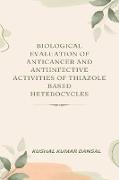- Start
- Biological Evaluation of Anticancer and Antiinfective Activities of Thiazole Based Heterocycles
Biological Evaluation of Anticancer and Antiinfective Activities of Thiazole Based Heterocycles
Angebote / Angebote:
For ages, human beings have been using medicinal agents until the concept of
medicinal chemistry and DNA microarrays identify to them. A DNA microarray is a
powerful genomic tool for biomedical and clinical research, while medicinal
chemistry is a discipline at the intersection of numerous other disciplines such as,
synthetic organic chemistry, pharmacology, molecular biology, etc. DNA microarrays
and medicinal chemistry constitute the essential step in the discovery of a new drug
for disease and identification of the protein target that is the basis of disease.
The term drug is the fundamental and most long-standing debates related to the basic
concepts of health and disease. Its historic roots arguably date back to ancient times.
The phrase drug originated from the French word 'Drogue' and refers to a desiccated
herb, which sturdily recommends that primary drugs were isolated from plant origin
[Wadud et al, 2007]. On the contrary, the disease is any condition that impairs the
normal well being of the body. In particular, no study, to our knowledge, has
considered that provides the evidence to claim how old the concept of the disease and
drug is. Thus, it appears the terms drug and disease possibly come into fact at the
same time. The earnest attempt by leading researchers to manage and treat the
diseases has led to investigating new drug candidates or appropriate analogueues of
active drugs. Initially, the drugs were isolated from sources such as, plant, animal and
mineral sources, but due to some shortcomings e.g. the lack of potency and decisive
cure and occasionally more toxicity, the identification of new drugs that are improved
potency and reduced toxicity became crucial. The process of drug development turned
into an imperative part and is intended at revising the biological action of drugs,
predominantly to lessen the side effects and to enhance the potency of the drugs.
Subsequently, at present, > 60% drugs employed in clinics are synthetic analogueues
and the sphere of synthetic medicinal chemistry is broadening day-by-day.
A series of studies on pharmacophore approaches in facilitating drug discovery
process has been reported in recent years.Currently, pharmacophore modelling has
been extensively used in various ligand-based and structure-based methods and
successfully practised in essential screening, de novo architecture and lead
modification after the progress made in computational chemistry in the past two
decades [Yang, 2010]. Today, in modern medicinal chemistry a great diversity of
software tools is available to the researcher in the area of analogueue design/ligandbased
pharmacophore modelling.
Folgt in ca. 5 Arbeitstagen
